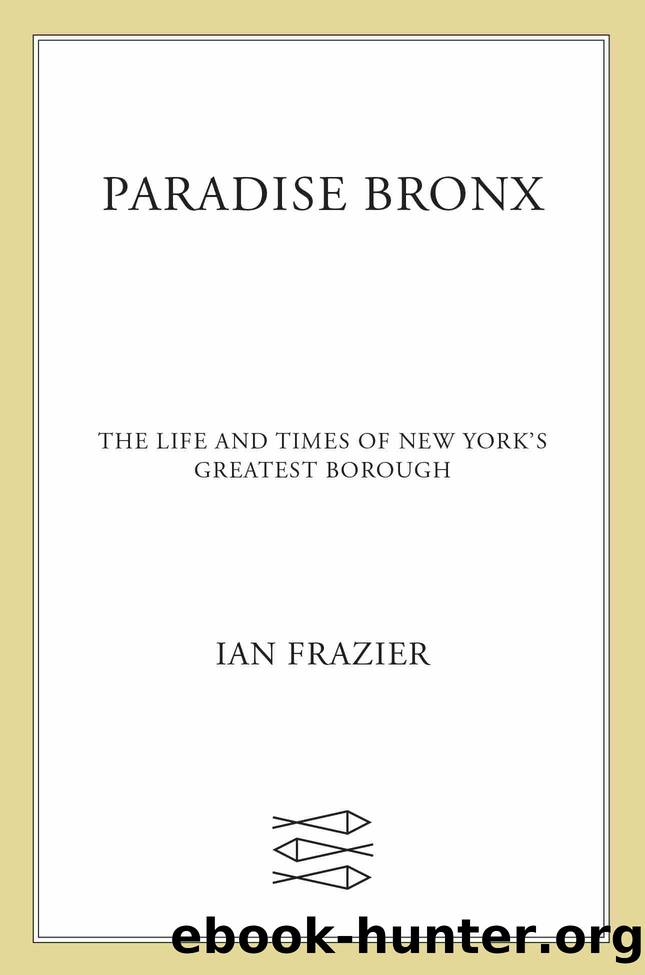Paradise Bronx by Ian Frazier

Author:Ian Frazier
Language: eng
Format: epub
Publisher: Farrar, Straus and Giroux
* * *
Naisonâs favorite hangout spot, back in his radical youth, was the Liberation Bookstore, on Lexington Avenue and 131st Street in Manhattan, next door to the New York City headquarters of the Black Panther Party. Some of the early political demonstrations he participated in were to protest government actions against the Black Panthers. The group also had an office on Boston Road in the Bronx.
Despite the big impression the Panthers made on the popular imagination, they lasted not long as an actual functioning group. In the BAAHP oral histories they appear rarely, as when a woman describes going to the Manhattan office to ask if she can join the organization; Afeni Shakur, one of the leaders, tells her she canât be a Panther because she doesnât even know how to wrap a gele (a Nigerian head garment, pronounced âgaylayâ). Shakur and another Panther then show her how to wrap it. When she does it correctly herself on the first try, they say, âWow, youâre a Panther now!â J. Edgar Hoover, head of the FBI, called the Black Panthers the countryâs most serious domestic threat, and set about to destroy them, with informers, jail sentences, and police killings. Afeni Shakur was one of fourteen Panthers charged with major crimes in New York, including plotting to blow up the New York Botanical Garden. After a long trial, a jury acquitted her and the others of all charges in May 1971. She gave birth to her son, Tupac, the following month.
The Panthers did the country no favors with their emphasis on guns, and their insistence that everybodyânot only Blacks, but everybodyâarm themselves. (They did, however, scare the California state legislature into passing stricter anti-carry laws.) But seeing the Panthers marching in dark glasses and berets and black leather, and hearing their speeches, gave a lift to Black pride, and to a mood of defiant self-possession in general. They also left a civic legacy with their free breakfast and lunch programs for schoolchildren in cities across the country. The scientifically proven idea that kids learn better when theyâre not hungryâa fact the Panthers made much ofâcaught on. It underlies the school breakfast programs widely in operation in the United States today. The Panthers understood food. They sometimes even brought meals to fellow organizers and protesters at sit-ins. In 1988, long after the organization was defunct, Bobby Seale, one of its founders, published a recipe book called Barbequeân with Bobby. Food brought out the Panthersâ gentler side.
The Young Lords, a group of mostly Puerto Rican activists, idolized and modeled themselves on the Panthers. The life span of the Lords as an organization was also short. They emerged in New York in 1969 with a protest against the sanitation services in East Harlem, during which they blocked the streets with bags of uncollected garbage. Then they occupied a Methodist church and refused to leave. They hijacked a mobile X-ray unit and took patientsâ chest X-rays on their own, making a point about the high rate of TB among Puerto Ricans, and about the inequality of medical care.
Download
This site does not store any files on its server. We only index and link to content provided by other sites. Please contact the content providers to delete copyright contents if any and email us, we'll remove relevant links or contents immediately.
Keeper of Genesis by Graham Hancock(1642)
Hieroglyphs: A Very Short Introduction by Penelope Wilson(1348)
The Road to Ubar by Nicholas Clapp(1191)
Rembrandt Drawings by Rembrandt(1159)
A Short History of the World in 50 Failures by Ben Gazur(1125)
The John Green Collection by Green John(1058)
Catching Fire: How Cooking Made Us Human by Richard Wrangham(1008)
Forbidden Archeology's Impact: How a Controversial New Book Shocked the Scientific Community and Became an Underground Classic by Michael A. Cremo(1004)
Hidden History: Lost Civilizations, Secret Knowledge, and Ancient Mysteries by Brian Haughton(916)
Primitive Mythology by Joseph Campbell(907)
The Creation of Inequality: How Our Prehistoric Ancestors Set the Stage for Monarchy, Slavery, and Empire by Kent Flannery & Joyce Marcus(887)
Hidden History by Jim Willis(879)
The History of Atlantis by Lewis Spence(826)
Neolithic by Susan McCarter(814)
Dinosaurs by Norman David;(810)
Searching for the Messiah by Barrie Wilson(788)
Ancient History from Coins by Howgego Christopher;(740)
The Ancient Giants Who Ruled America: The Missing Skeletons and the Great Smithsonian Cover-Up by Dewhurst Richard J(727)
The Christians Who Became Jews by Christopher Stroup;(723)
